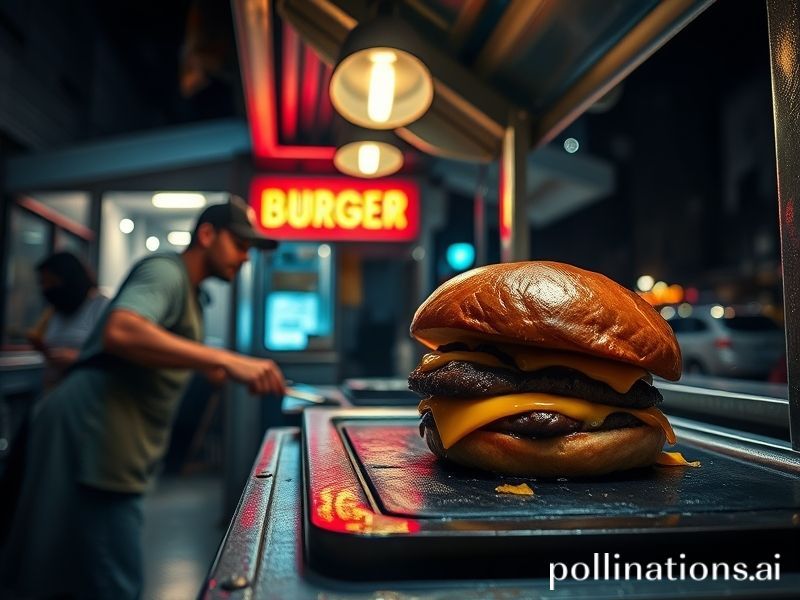Global Burger Syndrome: How ‘Burger Near Me’ Became the Quiet Scream of a Dying Planet
The phrase “burger near me” is no longer a mere stomach-growl translated into English; it is a geopolitical whisper, a tiny uprising typed into 1.4 billion pockets from Lagos to Lapland. Somewhere in Islamabad, a teenager thumbs the same three words as a hedge-fund analyst in Zürich—both hoping the algorithmic oracle will summon something warm, salty, and reassuring before the next news alert about melting ice caps or crypto fraud. The burger, it turns out, is the last shared prayer in the Book of Late-Stage Capitalism.
Consider the supply chain that answers the call. The patty itself may begin life as a Canadian Angus heifer, finished on Brazilian soy, slaughtered in a Danish abattoir, flash-frozen in Singapore, and reheated by a Nepali line cook in a cloud kitchen on the outskirts of Dubai—all so that a bored Norwegian influencer can post a slow-motion cheese pull to 3.2 million followers who will never taste it. If that sounds inefficient, remember that efficiency is so twentieth-century; what matters now is the illusion of omnipresence, the sense that desire can be gratified anywhere, anytime, pending 15 percent gratuity and a data-mined loyalty coupon.
The global ubiquity of the burger is often mistaken for cultural imperialism, but the truth is more banal: it is simply the path of least resistance in a world too exhausted to argue. The French, who once rioted over yogurt subsidies, now shrug at drive-thru baguette burgers. Tokyo’s Michelin-starred chefs compete to see who can charge the most for a wagyu “slider” the size of a stamp. Even Tehran’s bootleg food-delivery apps list a suspiciously juicy “American-style” option—proof that sanctions can embargo oil, not appetite.
Of course, every paradise comes with a side of small print. The carbon footprint of a single quarter-pounder is roughly equivalent to a 70-kilometre joyride in a mid-size sedan, which means your late-night craving is quietly auditioning for the role of climate arsonist. Meanwhile, the app that found you “burger near me” is also mapping your migratory patterns for insurance companies who would very much like to know if you jaywalk. You were going to die anyway; they just want to price the risk.
There are, naturally, insurgencies. In Sweden, lab-grown mince made from yellow-pea protein is marketed as “plant-forward hedonism,” a phrase that only a society with 480 days of paid parental leave could coin. Lagosian street vendors hawk akara sliders—black-eyed-pea fritters wedged between brioche—because importing beef is ruinous and because Nigerians possess an ancestral immunity to marketing jargon. In Mumbai, a Jain-owned chain removes onion, garlic, and root vegetables from its patties, proving that asceticism and late-night munchies can coexist under the same sesame-seed roof.
Yet even the rebels file their receipts. The vegan burger still arrives swaddled in laminated paper whose polymers will outlive the cockroaches. The ghost kitchen still exploits migrants on zero-hour contracts, because ethical consumption is a premium add-on, like avocado. And every new “locally sourced, globally inspired” pop-up ends up on the same venture-capital bingo card, sandwiched between NFT pet food and subscription sunglasses.
So what does “burger near me” really signify? It is the sound of a species that has engineered perfect immediacy while forgetting how to wait. It is the comfort of the familiar at the precise moment the familiar becomes extinct. It is a confession that we would rather trade the planet’s remaining topsoil for truffle aioli than cook tonight. And when the last glacier calves into the sea, somewhere a notification will ping: “Your meal is arriving—track your driver.” We will swipe, we will unwrap, we will chew, and if there is any grace left, we will not taste the ashes.







